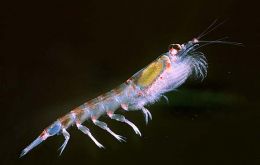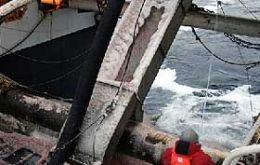MercoPress. South Atlantic News Agency
Tag: Krill
-
Monday, January 2nd 2012 - 03:49 UTC
Two leading groups involved in major dispute over krill properties’ patents

US Patent and Trademark Office (USPTO) this week granted Aker BioMarine’s request for re-examination of US patent number 8,030,348 assigned to competitor Neptune Technologies and Bioressources. The re-examination was approved for all 21 claims of the patent and in consideration of multiple references presented by Aker BioMarine.
-
Thursday, December 29th 2011 - 22:07 UTC
Scientists establish critical benchmark link for seabirds and available food

An international group of scientists has shown that many seabirds begin to suffer when the food available for them in the ocean declines below a critical level. This level is about one-third of the maximum measured amount of food available. They have found that this critical level is about the same for seabird species around the world. Their study — the most comprehensive ever undertaken — covers birds from the Arctic to the Antarctic and from the Pacific to the Atlantic.
-
Tuesday, April 12th 2011 - 20:20 UTC
Antarctica penguin species suffering from declining krill availability, says NOAA

A number of penguin species found in western Antarctica are declining as a result of a fall in the availability of krill, a study has suggested. Researchers, examining 30 years of data, said chinstrap and Adelie penguin numbers had been falling since 1986.
-
Monday, February 21st 2011 - 17:16 UTC
Krill sex caught on camera in 700 metres deep Antarctic waters

In a world first, the sex life of Antarctic Krill in the wild has been caught on camera revealing the shrimp-like creatures are able to mate deeper in the ocean than previously thought.
-
Saturday, December 25th 2010 - 08:34 UTC
US scientists looking into data suggesting sustained decline of Antarctic krill

By Susan Moran - They’re called “the krillers” around Palmer Station, because they’re always on the hunt for Antarctic krill: tiny, shrimp-like crustaceans that form the foundation of the Antarctic food web.
-
Monday, August 16th 2010 - 19:11 UTC
Scientists survey krill fishery and possible marine protected area in South Georgia

The two South Georgia Island King Edward Point (KEP) based scientists are undertaking regular winter survey work at sea to investigate the spatial overlap between the winter krill fishery and the distribution of foraging predators and fish larvae in South Georgia waters, reports the SG newsletter.
-
Friday, April 23rd 2010 - 02:55 UTC
China interested in krill fisheries to cut foreign dependence

China has sent its ocean-going fishing vessels Kai li and An Xin Hai to the Antarctic for the 2010 krill fishing season. During a 23 day exploratory fishing they caught 2.000 tons of krill, with a daily output of 100 tons, three times than originally expected.
